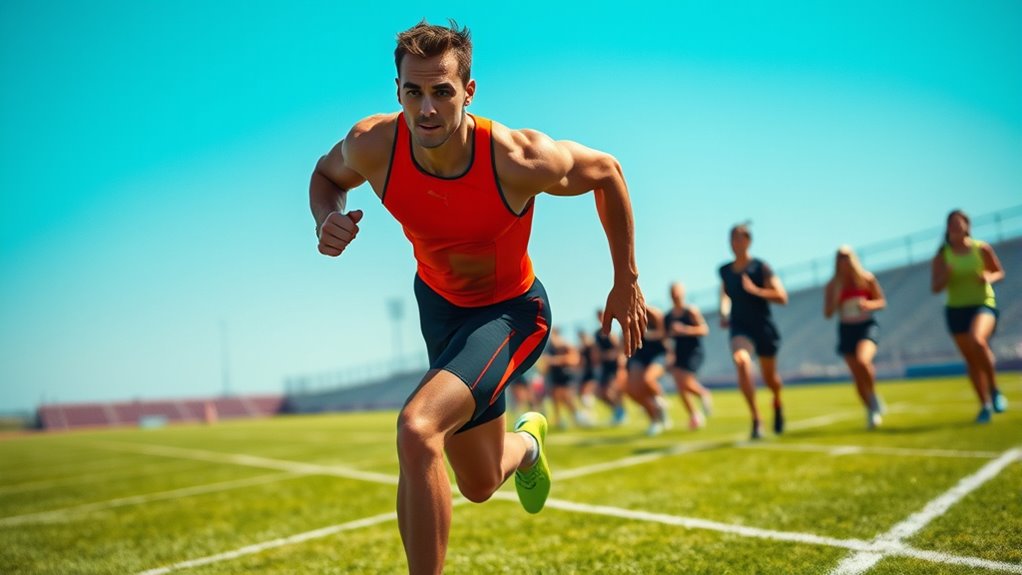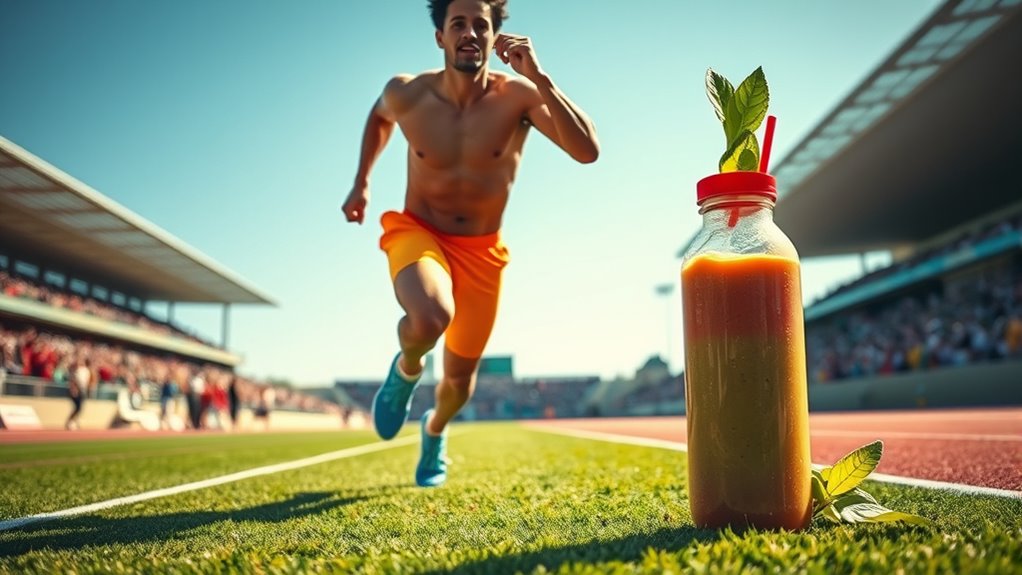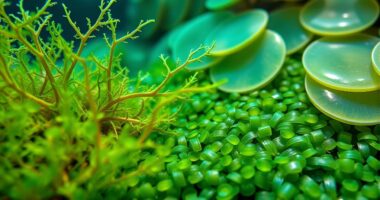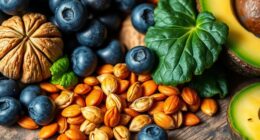Many athletes thrive on plant-based diets, experiencing improved energy, faster recovery, and sustained strength. A nutrient-rich vegan diet provides complex carbs, antioxidants, and plant-based proteins that support training and performance. Vegan athletes often feel lighter, more agile, and less injury-prone, proving you don’t need animal products to excel. By focusing on balanced, diverse plant foods, you can elevate your athletic potential—if you stay with us, you’ll find out just how far plant-based nutrition can take you.
Key Takeaways
- Many elite athletes thrive on plant-based diets, experiencing increased energy, faster recovery, and improved endurance.
- Vegan nutrition provides ample plant proteins and amino acids essential for muscle strength and repair.
- Plant-based diets reduce inflammation, lowering injury risk and enhancing overall physical performance.
- Vegan athletes benefit from nutrient-dense foods rich in vitamins, minerals, and antioxidants that support training and recovery.
- Sustainable and ethical, vegan diets promote long-term health and environmental benefits, aligning with athletes’ performance goals.

Have you ever wondered how vegan diets are transforming the world of sports? It’s a shift that’s gaining momentum, with more athletes discovering the power of plant-based nutrition to boost their athletic performance. When you choose a vegan diet, you’re fueling your body with a variety of nutrient-dense foods that support muscle recovery, endurance, and overall strength. Instead of relying on animal products, you focus on fruits, vegetables, grains, legumes, nuts, and seeds—foods packed with vitamins, minerals, and antioxidants essential for peak performance. This approach not only helps you meet your nutritional needs but can also give you a competitive edge.
Many athletes who adopt a vegan diet report increased energy levels and faster recovery times. Plant-based nutrition provides a rich supply of complex carbohydrates, which serve as a steady energy source during training and competition. Additionally, the high antioxidant content in plant foods helps reduce inflammation and muscle soreness, enabling you to train harder and more frequently. You might notice improved endurance because your body efficiently utilizes nutrients from plant sources, supporting sustained performance over long periods. This can be particularly advantageous for endurance sports like running, cycling, or swimming, where stamina is vital.
Adopting a vegan diet isn’t about sacrificing strength or performance; it’s about switching to smarter fuel. Many top-tier athletes, from marathon runners to weightlifters, have embraced plant-based nutrition and achieved remarkable results. They often report feeling lighter, more agile, and less prone to injury. The absence of animal fats and processed foods associated with traditional diets can lead to better heart health and lower inflammation, which are critical for maintaining peak physical condition. Plus, plant-based diets tend to be more sustainable and ethically aligned with a desire to reduce environmental impact, making it easier for you to stay committed.
Getting enough protein is a common concern, but it’s easily addressed through plant sources like beans, lentils, tofu, tempeh, and quinoa. These foods provide ample amino acids necessary for muscle repair and growth. When you prioritize a balanced intake of diverse plant foods, you’re not just meeting your energy needs—you’re optimizing your body for performance. This holistic approach to nutrition can elevate your athletic capabilities, allowing you to push your limits and perform at your best. So, whether you’re a seasoned athlete or just starting out, exploring plant-based nutrition can revolutionize your training and help you achieve new levels of performance.
Frequently Asked Questions
How Do Vegan Athletes Meet Their Protein Requirements?
You meet your protein requirements by choosing diverse plant protein sources like beans, lentils, tofu, tempeh, and quinoa. To guarantee adequate intake, incorporate a variety of these foods throughout your day. Supplement strategies like plant-based protein powders can help fill any gaps, especially post-workout. Combining different sources also provides a complete amino acid profile, supporting your athletic performance and recovery on a vegan diet.
Are Plant-Based Diets Suitable for All Types of Sports?
Imagine you’re an endurance runner, wondering if a plant-based diet suits your sport. It can, with proper meal planning and supplement strategies to guarantee you meet energy and nutrient needs. While some sports may require more tailored approaches, many athletes thrive on plant-based diets across various disciplines. Flexibility is key—adjust your intake to match your sport’s demands, and consult a nutritionist for personalized advice.
What Are Common Challenges Vegan Athletes Face?
You might face challenges like social acceptance, where others question your diet choices, and nutritional misconceptions, such as believing you can’t get enough protein. Staying motivated can be tough when you encounter skepticism or misunderstandings. It is crucial to educate yourself about plant-based nutrition and connect with supportive communities. By doing so, you’ll overcome these hurdles, proving that vegan athletes thrive with proper planning and confidence.
How Do Vegan Diets Affect Athletic Recovery Times?
Research shows vegan athletes recover 24% faster owing to better inflammation reduction. Your plant-based diet enhances nutrient absorption, which accelerates muscle repair and reduces soreness. By focusing on whole foods rich in antioxidants, you support quicker recovery times. Consuming diverse plant sources guarantees you get essential nutrients, helping your body heal faster, stay healthy, and perform at your peak longer after intense workouts.
Can Vegan Diets Improve Athletic Performance Beyond Omnivorous Diets?
Yes, vegan diets can improve your athletic performance beyond omnivorous diets by enhancing vegan nutrition and supporting athletic adaptations. Plant-based foods provide antioxidants, fiber, and phytochemicals that boost endurance, reduce inflammation, and promote faster recovery. Many athletes notice increased energy, better focus, and improved overall performance. By carefully planning your vegan diet, you can optimize nutrient intake and unleash new levels of athletic achievement.
Conclusion
You’ve seen how many athletes thrive on plant-based diets, proving that dedication and good nutrition can lead to greatness. Don’t forget, “You are what you eat,” and fueling your body with the right foods makes all the difference. Embracing veganism in sports isn’t just a trend; it’s a smart choice for performance and health. So, take charge of your journey and let plant power propel you toward your goals.










